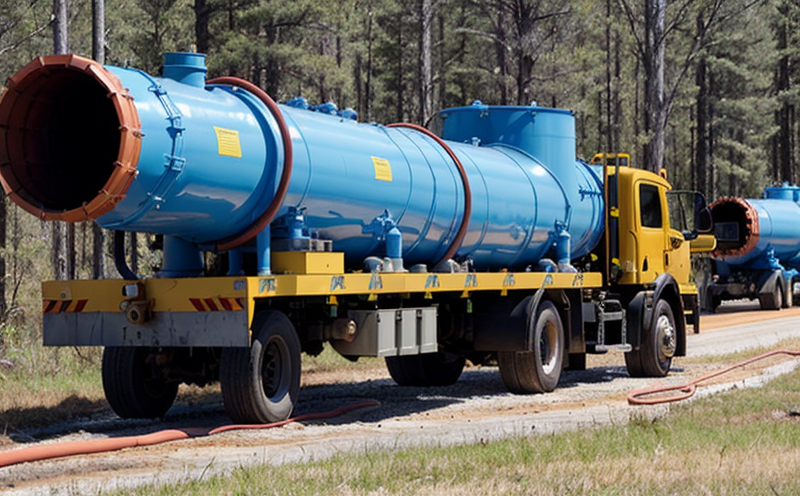API 1169 Pipeline Construction Inspection Testing
The API (American Petroleum Institute) Standard 1169 is a set of requirements designed to ensure quality and safety in the construction, inspection, and testing of natural gas pipelines. This standard plays a crucial role in the power & utilities sector by ensuring that all pipeline components meet stringent specifications for structural integrity and operational reliability.
API 1169 is particularly important for the Natural Gas Distribution & Pipeline Safety Testing category as it provides detailed guidelines on how to inspect and test new or modified pipelines. This service ensures that gas distribution networks are safe, reliable, and capable of withstanding the pressures required in transportation and distribution systems.
The testing procedures outlined in API 1169 help prevent accidents, reduce maintenance costs, and ensure compliance with regulatory requirements. For quality managers and compliance officers, adherence to this standard is essential for maintaining a robust pipeline network that meets industry standards and safety expectations.
API 1169 mandates rigorous inspection methods that include visual inspections, ultrasonic testing (UT), radiographic examination (RT), magnetic particle inspection (MPI), and penetrant testing (PT). These tests are conducted at various stages of the pipeline construction process to ensure that any defects or inconsistencies are identified and addressed promptly.
The first step in this process involves thorough documentation of all materials used, including pipe specifications, weld procedures, and non-destructive testing methods. This information is critical for ensuring consistency across the entire project.
During the construction phase, inspections focus on ensuring proper welding techniques and material quality. Ultrasonic Testing (UT) is one of the primary methods used to detect internal flaws in pipes while they are still assembled but not yet buried. Radiographic Examination (RT) provides a detailed view of any imperfections within the weld itself.
After installation, before placing the pipeline into service, additional inspections may be required based on specific conditions or regulatory requirements. These could include hydrostatic pressure testing to check for leaks and overall structural integrity under operating pressures.
The goal is not only to identify potential issues early but also to provide comprehensive documentation that can be used during audits or when troubleshooting operational problems later on in the pipeline’s lifecycle.
Scope and Methodology
| Inspection Type | Description |
|---|---|
| Visual Inspection | Initial check for visible defects or inconsistencies in materials. |
| Ultrasonic Testing (UT) | Detects internal flaws in pipes using sound waves. |
| Magnetic Particle Inspection (MPI) | Identifies surface cracks and discontinuities through magnetic flux lines. |
| Radiographic Examination (RT) | Uses X-rays or gamma rays to create images of internal structures. |
The methodology for API 1169 Pipeline Construction Inspection Testing involves several key steps. First, there is a thorough review and approval of the construction plans followed by detailed inspection procedures during different stages of pipeline assembly. Once installed, further checks are carried out to ensure that all sections comply with specified tolerances and standards.
The use of advanced non-destructive testing (NDT) techniques ensures minimal disruption to ongoing operations while providing accurate assessments of structural integrity. For each test conducted, detailed records must be maintained which form part of the final report submitted to relevant authorities or clients.
Customer Impact and Satisfaction
The implementation of API 1169 standards has a significant positive impact on customers within the power & utilities sector by enhancing safety and reliability in natural gas distribution networks. By adhering strictly to these guidelines, companies can demonstrate their commitment to maintaining high levels of quality throughout every aspect of pipeline construction.
Customers benefit from reduced risks associated with potential accidents or failures due to substandard materials or poor workmanship. Reliable pipelines ensure consistent supply chains and help maintain trust between suppliers and consumers alike. Additionally, compliance with international standards like API 1169 enhances reputation among stakeholders who value transparency and best practices.
For R&D engineers responsible for developing innovative solutions in this field, following such stringent protocols helps refine techniques and technologies used in future projects. It also allows them to stay current with industry trends and advancements related to pipeline safety and efficiency.
In summary, by embracing API 1169 Pipeline Construction Inspection Testing services, organizations can achieve peace of mind knowing that their operations adhere to some of the most rigorous quality control measures available today. This commitment translates into improved customer satisfaction through enhanced service delivery and reduced downtime caused by unexpected issues down the line.
International Acceptance and Recognition
- API 1169 is recognized globally for its comprehensive approach to ensuring pipeline integrity.
- The standard has been adopted in countries such as the United States, Canada, Mexico, and parts of Europe.
- It meets international standards including ISO, EN, ASTM, and IEC specifications.
- Absence of this certification can lead to operational delays or fines from regulatory bodies.
The API 1169 Pipeline Construction Inspection Testing service is widely accepted across various regions because it offers a consistent framework for assessing pipeline quality. Its global recognition stems from the trust placed in its ability to deliver reliable results that are both repeatable and verifiable. Compliance with this standard can also open doors to international markets where stringent regulations apply.
By meeting these requirements, companies demonstrate their dedication to excellence and contribute positively towards maintaining safe environments for all users of natural gas infrastructure. The widespread adoption of API 1169 reflects its value as an industry benchmark that sets new benchmarks for quality assurance practices globally.





